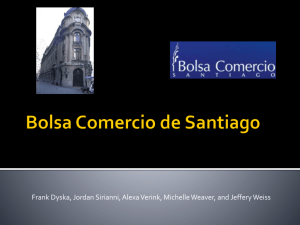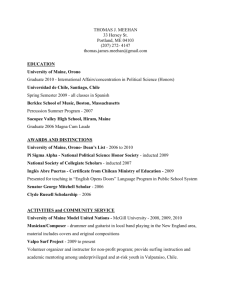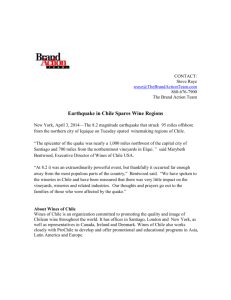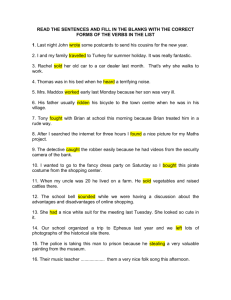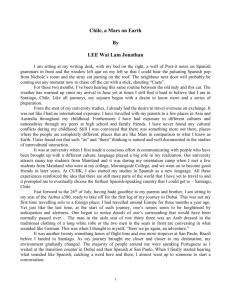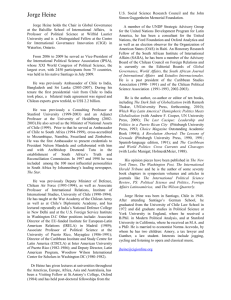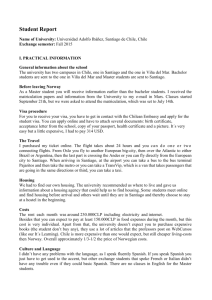Document 10860706
advertisement
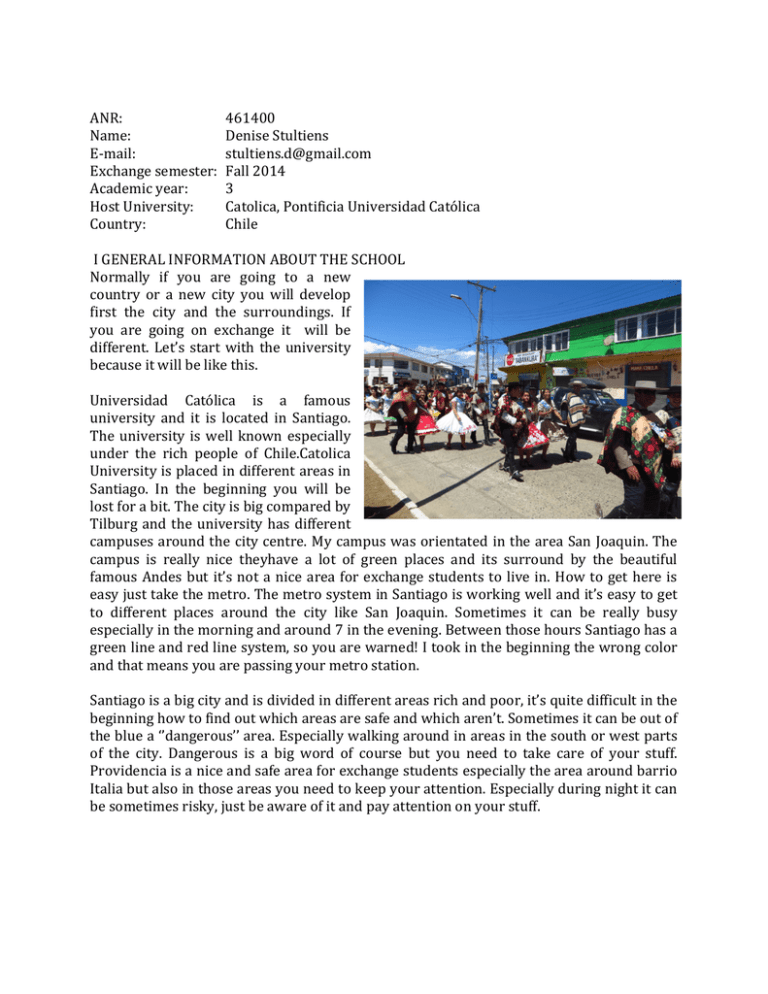
ANR: 461400 Name: Denise Stultiens E-­‐mail: stultiens.d@gmail.com Exchange semester: Fall 2014 Academic year: 3 Host University: Catolica, Pontificia Universidad Católica Country: Chile I GENERAL INFORMATION ABOUT THE SCHOOL Normally if you are going to a new country or a new city you will develop first the city and the surroundings. If you are going on exchange it will be different. Let’s start with the university because it will be like this. Universidad Católica is a famous university and it is located in Santiago. The university is well known especially under the rich people of Chile.Catolica University is placed in different areas in Santiago. In the beginning you will be lost for a bit. The city is big compared by Tilburg and the university has different campuses around the city centre. My campus was orientated in the area San Joaquin. The campus is really nice theyhave a lot of green places and its surround by the beautiful famous Andes but it’s not a nice area for exchange students to live in. How to get here is easy just take the metro. The metro system in Santiago is working well and it’s easy to get to different places around the city like San Joaquin. Sometimes it can be really busy especially in the morning and around 7 in the evening. Between those hours Santiago has a green line and red line system, so you are warned! I took in the beginning the wrong color and that means you are passing your metro station. Santiago is a big city and is divided in different areas rich and poor, it’s quite difficult in the beginning how to find out which areas are safe and which aren’t. Sometimes it can be out of the blue a ‘’dangerous’’ area. Especially walking around in areas in the south or west parts of the city. Dangerous is a big word of course but you need to take care of your stuff. Providencia is a nice and safe area for exchange students especially the area around barrio Italia but also in those areas you need to keep your attention. Especially during night it can be sometimes risky, just be aware of it and pay attention on your stuff. The best places to go…. to give you just a list with nice restaurants and bars will be boring. Walk around and try to find the vibe that you like. The city is divided in barrios/areas and it’s really easy to find out what you like. I enjoyed barrio Lastarria a lot; it’s surrounded by theaters, art, music and nice handcrafts but also barrio Italia and barrio Brazil are favorites. In the first week you will be the tourist and you can do the touristic list. Do you have a nice beautiful city in your mind? Take this out of your mind, Chile is not really beautiful so take a dive and get in the way of living. There are of course some museums like Museo de Belles Artes, los Derechos Humanos and Museo de la Memoria. Chile has a rich history and its good to know something about it, especially the last two museums are about the history of Chile.Its interesting and it will give you more information about the time of Pinochet. But my advice will be watch some movies about the history of Chile before you are going or when you are there. There happened a lot in the history and it’s still noticeable in daily life and sometimes its quite hard to understand the way of behavior of people. Not directly in the beginning but after a few months you will notice there are some different point of views from the people around you like the communication style, the way of talking etc. Especially Machuca and No are good movies to watch, of course in Spanish; Chilean Spanish. The university has four different campuses. You can find the main building in the city centre and it’s called Casa Central, this will be the campus were you will have your introduction day. It’s the main building of the campus so for all your administration you need to be here. San Joaquin, Oriente and Lo contador are the other three campuses. Where you will end up will be depending on the courses you will choose. Oriente and Lo Contador will be orientated in arts and music. San Joaquin offers a lot of different courses and you can find almost everything on this campus. There are so many different faculties and all those different faculties having their own library and those faculties are San Joaquin is the biggest campus from Catolica. So there are a lot of facilities available studying, swimming till praying in the church. They offer a lot of sports on San Joaquin, they provide the sports as courses and you can even get credits for it. UC is also organizing parties for exchange students and most of the time they are also organized on the campus. Study structure In the beginning you will have an introduction day at Catolica campus, the professor will give you a lot of information about the semester and they will give you an information book. This information book is full with courses you can choose for the semester. You need to choose your own program, you can choose whatever you want and it is full of useful information. It depends on which courses you are choosing when your program is starting. Most of them starting in the beginning of a semester, the schedule is quite similar with Tilburg University. Every week you have the same classes at the same hour. The only difference is that the classes taking a long time most of them are 1,5 hour without any break. In the beginning CAUC is organizing a lot of events to know more about the university. The classes that I took had exams or an assignment every week or essays needed to be written. At the end of your semester you will have the final exams from the classes; those including all the lectures from the semester. Luckily you will have a lot of libraries available to study, the libraries have computers and silence rooms. Numbers of the university Last year Catolica has been reported 22654 number of students out of these numbers 4665 are graduated. Under the exchange students Catolica is hosting 1612 exchange students most of them are from the United States. II PRACTICAL INFORMATION Information before you left Around May I received the information from the host university. They send me information about hosting and about the university kind of a program for exchange students. Besides that I received a lot of emails from Patricia. I never had problems with the university; Patricia is answering your questions immediately. Visa procedure and arrival For Chile you need to have a student visa, the visa is quite expensive and I didn’t feel like paying for a visa 300 euro. Luckily it was also possible to get in the country with a tourist visa you only need to go out of the country after three months. A tourist visa is for free so you only need to pay costs for a weekend trip to Mendoza, Argentina. I never had difficulties with this visa, I have been entering Chile a couple of times and at school they never asked me for the visa. Besides that the people with the student visa had some difficulties to organize bureaucratic papers in Santiago, like waiting hours for days. I flew to Chile, Santiago and I stayed for two weeks in Bella Vista Hostel. It was a really nice place and they were really helpful with finding a room. The people who were working there were all students from different countries. Besides that I met so many nice people and those two weeks were a good introduction for Chile. The introduction of school started in the first week of school. If you will have problems or questions you can always contact Patricia from UC, she is really helpful with information about school but also hosting. The school is quite organized I never had to go organize something at school. The first few weeks will be a little a mess you are not used to Chile yet, besides that the campus is quite big and you need to find your way and you need to find all the buildings were you will have classes. In the first week you will have the opportunity to find out information about the classes you can follow all the classes what you like and eventually you can decide which classes you will choose. The organization and the registration of the classes will be a little bit a mess because you need to go to the faculty and to the professors to sign you up, be prepared it will be all in Spanish. Orientation/Introduction activities CAUC is an international community from Catolica, its all organized by students and those students are really helpful and really open minded. The orientation and the introduction days has been organized quite in a Chilean way, but you will find your way in this structure. There are possibilities to do tandem tours with other exchange students or students from UC, they will help you to improve your Spanish skills. Besides that they organize a day in the week to see the highlights from Santiago and help to find your way into Santiago. Housing Comparto depoto is a good site full of possiblites to live in Santiago de Chile. The website is full of advertisements and it is free to organize meetings. It will take you a few days/weeks to find something what you will have in your mind. Besides that it is important to notice the areas before you will contact people it will save you a lot of time. It is easy to find a nice hostel where you can spend some time and just take your time to find a nice place because it is worth it. For your Spanish it would be better to end up in a house with Spanish people but unfortunately the landlords can’t promise this. The school is offering kind of a student houses only for girls or boys, quite strict rules but probably it will be organized well. I chose to find my own place and to be honest I never met people who organized the housing with the university. Living Costs First, Chile it’s not a cheap place. Probably the way of living in Holland is cheaper. Especially the living costs like the supermarkets are quite expensive. I didn’t expected this because normally if you are going abroad it will be cheaper than Holland. Housing will be more expensive than in Holland, you will have some cheap opportunities but I ended up with dodgy people so keep your eyes open. Supermarkets are expensive especially the vegetables and the fruits. Most of the times you can find in the neighborhoods some markets, sometimes it can be cheaper and you will have more choice and the quality will be better. Most of the money I spend on housing and on the living costs like the metro, buses, food and late evenings. But eventually travelling will be always more expensive and in my opinion you can better spend your money for travelling because the way of living will be most of it similar with your way of life in Holland. − Housing My room was 375 euro each month, including one month of deposit that we never got back. − Food The supermarkets would be quite expensive for low quality; I guess it was around 250 euro each month. − Transport Taking the metro would cost you 2 euro each way. Approximately 8 euro each day, buying a bicycle could be a nice opportunity − Books Luckily you don’t need to buy books on school, they will offer you papers and those papers you can print them on the university for free. You are allowed to print 100 pages each day for free. − Miscellaneous Going out for dinner and some drinks will cost you the same amount of money as in Holland. Academic Calendar Arrival date & introductory week I arrived the 16th of July and the first week of school was the introduction week. The introduction week was quite nice and well organized. First day of the semester? Would depend on the courses you will choose probably after two or three weeks you will have an official schedule. My first day started around 15th of August. My last week was the last week of November in this week we had the final exams but also this week depends on the courses you will choose. We didn’t had a kind of mid-­‐term break; 18th of September they have a national celebration day Fiestas Patrias, around those days some classes are canceled and you can call it kind of a mid-­‐term break. But it can be possible that you will be really busy with school. The International Office The international office can you find on the central campus. Besides that the organization CAUC has a area on the campus San Joaquin. The international office will help you with all your questions also the organizing program for school, your week schedule and the access to internet on your laptop or mobile phone. Patricia is responsible for incoming exchange students, she will send you in the beginning all the emails for the exchange procedure. But she is available for all your questions she will reply you always in a day and she is really helpful. Also the people from the CAUC organization they really want to help you and they will help you to find your way on the campus and in Santiago. CAUC is organizing a lot of events from parties, diners till surfing. Sometimes you can go away with them for a week and they offer you a cheap opportunity to travel in Chile and to know a lot of international students. You can find the organization already on facebook, add them as a friend and if you have already questions they will help you. It is also nice to see already kind of a program and some photos from the travels that they made with the exchange students. The students on Catolica are in kind of a way shy to exchange students. The students are really helpful but sometimes it will be difficult to get to know them. Luckily I was living in an house with students who have been living there already half a year and via them I had to change to know a lot of Chilean people. I recognized on school it was a little bit hard in the beginning because the Spanish was quite difficult to understand and to communicate with each other. It is quite easy to get in contact with exchange students because of the organization CAUC. Besides that if you are going two or three times to an asado/Chilean barbecue you will know a lot of new foreign students and you will see each other every time again. The exchange students will have a facebookpage, they will be always at the same parties and besides that you will see them on school. So to get in contact with the exchange students will be really easy. To get in contact with exchange students will be easy and to find some people to travel with is easy. Everybody has the same plans and to find some travel buddies would be easily. I have been travelling a few times in Chile with the CAUC organization. We have been to Pichelemu, it is a really nice place for surfing. It is really nice to travel in Chile but it can be sometimes quite expensive but the nature is overwhelming and its al worth. Pucon is also a really nice place, a volcano where you can hike and enjoy the nature. Also the north of Chile is worth for a visit. I expected to travel more in Chile but school was quite heavy and I needed to study quite a lot, unfortunately I didn’t have that much time left for traveling in Chile. I expected to travel more during the weekends but Chile is quite difficult to travel because it is such a large strengthen country. Besides Chile it is really easy to travel up to the north to Peru and Boliva, also Argentina is really close and worth for visiting. South America is really beautiful and travelling by busses is nice because you can see a lot of the countries, but the countries are big and it will take some time. I planned my trip so I had time to travel for 2,5 months. I have been also to Uruguay and Brazil, Uruguay was nice but it was really expensive and it is better to travel longer in Brazil or Argentina if you are thinking about going to Uruguay. Don’t forget Bolivia and Peru those countries are so rich in culture and nature. The travels in South-­‐ America were amazing and definitely worth it. III ACADEMIC INFORMATION The partner university is offering a lot of different courses and you can choose whatever you want. Most of the courses are offered in Spanish but there are also some courses in English but they are less. The courses I followed where in Spanish. I am studying Psychology and the courses that I chose were focusing on antropologia and sociology I was curious to other subjects than psychology. For me all the subjects were on top and I wanted to focus on antropologia. Luckily there were many opportunities to follow courses in Antropologia. I really enjoyed Mapuche language and culture, it was such a nice and interesting course about the inhabitants of Chile. I didn’t know so much about the culture so it was a really nice opportunity to learn more about this culture at school. Also the teacher was adorable and she organized many excursions with the Mapuche people. Also the course Cultura de Chilena is really interesting if you want to know more about the history and global information of Chile. The level of Catolica is quite similar with Tilburg University. But sometimes it can be really hard especially with the language. Some teachers were sometimes easy to understand but others were not even understandable at the end of the semester. The level of the courses is the same but the problem is the language because you need to read so many times over and over again to know the Spanish words because we had always written essay exams. Those exams are quite difficult because you will never get the language totally. The teaching style is most of the time theoretical and most of the time they are not using powerpoint slides so it can be hard to follow them especially if you can’t understand everything. You can notice that the teaching style is different than at home. Sometimes they are a little bit behind, so is it possible that teachers are just reading a paper for 1,5 hour. There is sometimes no interaction at all and only theoretical stuff. Most of the time the teaching methods were only lectures. Mapuche was different it was full of interaction the teacher was really open for the students and helpful. She organized a lot of events and working groups, this is really nice because you will have more contact with the students and it is also better for your Spanish. The relationship with the teachers in Chile was more open than in Holland, the people were saying everything to the teachers. Also if their relationships were over they told the teachers, something about the weekend or the families. It was really nice to see that they were so close with the teachers; some of them were also kissing every student who was entering. But it was also depending on the teachers, so I am not sure if it is a cultural habit or just the way of interaction of the teacher. I followed five different bachelor courses; all those courses were 10 credits, 6 ECTS. Anthropological paradigmas ANT100 3 written open exams and one oral exam The course was really interesting it was really open and full of information, sometimes it was hard to follow because every week we had a new subject. Also the teacher was really hard to understand even till the end of the semester I had sometimes difficulties. Besides that the teacher was giving a lot of reading papers, all really interesting but it was a never ending story. Anthropology of religion SOL160A 3 written essays and a final exam I really enjoyed this course it was full of information about rituals from indigenous people and full of interesting reading papers. But she was given so many papers to read, it was really hard to catch up with the course. And also to written essays were really hard, I have been asking a couple of times if it was possible to write in English but unfortunately not. Also for the others courses it was not possible. This was quite a shame because the courses were so interesting but to write an essay in Spanish is still really difficult because they are expecting Spanish at university level Mapuche language & culture LET075E 3 written open exams, oral exam I really enjoyed this course, the teacher was so friendly and helpful with my Spanish and she really wanted to teach me the rituals about the mapuche and also the language. I enjoyed this course so much but also because this teacher was really helpful. The course was luckily not so difficult so it was nice to do this course. Spanish intermediate level LET085P 3 written exams, oral presentation This course is not really difficult is cost you only a lot of time like the other courses. The study hours for catolica are defiantly higher than in Tilburg University. You need to do a lot of homework and writing essays and so on. Chilean culture seminario IHI2370 4 written exams and a final exam This course is all about the Chilean culture, it is a nice course with a lot of information about Chile. This course is ok and it’s focused on exchange students. The pressure for this study is not that high like the others. Culture and Language ! Did you experience culture shock while on exchange? I always thought that during a culture shock you will be overwhelming by the culture and the people. But they told me already during the practical assessment. But luckily I found it out last year by myself; in the beginning it was full of nice interesting people and asado’s. Everything was new, school, the house and the people. It was really nice and it felt like travelling, everything is a new experience. But after three months I was missing my own friends and my family. I have been surrounded by really nice people but after a few months I was missing to have a wine together with my friends, to talk without any difficulties and communication problems. Living in a new place and country is different than travelling, after a few months your life in Santiago will be normal like in Holland, you will get used to go to school and going out with the people. The culture in Chile is nice, the people are friendly and outgoing. People living outside of the houses and like to spend as much time as possible outside the house with friends and family. Especially the family is really important but this always in combination with a few drinks like pisco and asado’s. The culture is not really overwhelming and different than Holland and you will notice the differences after a few months if you are getting more into the way of living over there. The people in Holland are more down to earth then the people in Chile. Especially the way of going out there, the guys will notice you everywhere and they will be the most romantic comedies. It’s not only the guys but also the girls are living in a big romantic world. It is nice to see this difference comparing with Holland, you are going on exchange to find out more about another culture and it is nice to see a difference. The people grew up in a catholic environment and you will notice this during daily life especially if you are studying on Catolica. I learned especially that people in Holland are more down to earth in the fact of communicating with people. They are more straight in communication and honest and the people in Chile are more reserve in the catholic way. You can see that they really want to be western and that they are struggling with their way of life they grew up with. Travelling to different countries make you realize that the Chilean culture is quite western. In the beginning I thought western? What are they talking about? But in comparing with the other countries in South-­‐America they are. It is nice to see that they are trying to mix their culture with a Western culture. In the beginning Spanish will be a struggle if you only followed the Spanish course on Tilburg University. The Spanish in Chile is different and you will notice this immediately. It would be difficult to understand them and to recognize that they are using a lot of different words then that you are used to use. It is difficult if you can’t speak the language because it will give you a distance with the people. It is difficult to communicate and to make contact. But you need to do this not only for your Spanish but also to get to know more people in your surroundings. To get to know more people surrounding you will be a big improvement for your Spanish. Luckily the university is offering language courses for free and it is nice to follow them to get more into the Chilean Spanish. Personal development I think it is always a good experience to know and to learn more about a different culture. Especially if you want to work with people I have been interested in rituals and cultures already my whole life. This is a part that I really miss in Holland and what I am always finding if I am going abroad. Its giving me an opener view and it is interesting to find out why people from other cultures think differently. During my stay I met a lot of different people from different countries and I always thought that other cultures were more focused on the families. But for the first time I found out that the culure is for sure focused on the families but in a negative kind of way. The children are not free to decide what they want. We are living in an opener culture, we can go to the family when we want to go. I found out that this is maybe better because its not an obligation and people are free to choose and are enjoying it in this way more, I think. If I had to change to do something different in Chile than I would move in to another house with Spanish speaking people. I really enjoyed my time but at the end I am a little bit disappointed in my level of Spanish I expected a higher level of Spanish.Most of the experiences that I had in Chile were amazing and I learned a lot. Some of the times I really missed to go out by myself. Just going during the night home alone, but this was not possible. Sometimes I was also getting annoyed by the man’s on the streets who were always saying stuff or were screaming. But most of all I really enjoyed my time there and it really became a second home there. I met so many nice and different people. I have been travelling to so many nice countries and I think an exchange is always worth to go for. Tips I always will recommend an exchange time, it is always a lesson and it is good for everyone to get out of your own environment. I really had a good time in Chile, socially, culturally and also academically. My university was really interesting and the offered so many opportunities. For me it was a good opportunity to follow totally different courses. I will never regret that I have been to Chile and I will recommend it to everyone and I definitely learned a lot from this experience.
